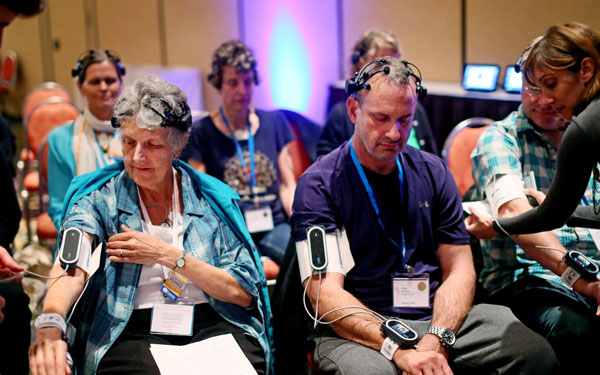 Dr. Eric Topol, one of the most well known figures in digital health and Dr. Deepak Chopra, one of the most prominent voices in alternative medicine, are teaming up to measure the effects of meditation with digital health devices. The study of 40 individuals was conducted by the Scripps Translational Science Institute with funding from the Chopra Foundation.
Dr. Eric Topol, one of the most well known figures in digital health and Dr. Deepak Chopra, one of the most prominent voices in alternative medicine, are teaming up to measure the effects of meditation with digital health devices. The study of 40 individuals was conducted by the Scripps Translational Science Institute with funding from the Chopra Foundation.
"Although the health benefits of meditation have been extensively studied, little is known about the immediate effects of meditation on the heart and vascular system, partly because of the difficulty collecting research quality data through conventional means," Scripps Health Director of Digital Medicine Dr. Steven Steinhubl said in a statement. "Wireless devices offer new ways to track blood pressure, heart rate, body temperature and other vital signs in a more discrete and non-disruptive way."
The study has already been conducted, but Scripps doesn't expect to have the results ready until next year. Forty participants, aged 20 to 72, came from around the world. Half were experienced meditators and half had never meditated before. Chopra led them in a weeklong meditation retreat at his center in Carlsbad, California.
Wireless health devices were used to measure meditating participants' vital signs in a minimally invasive way. Participants were measured for 40 minutes during a meditation session at the start of the week and for another 40 minutes at the end of the week. Heart rate and blood pressure were tracked by Sotera Wireless's ViSi Mobile System, including its recently FDA-cleared continuous blood pressure monitor. The Emotive EEG headset monitored patients' brainwaves, and the HealthPatch by Vital Connect tracked heart rate, skin temperature and respiration.
A statement from Scripps notes that while there have been many studies done on meditation, its exact effect on the body is still a matter of some doubt. A 2007 report by the federal Agency for Healthcare Research and Quality found flaws in most of the studies done on meditation.
"We’re excited about the opportunity to use wireless technology to gain more scientific data about meditation’s tangible benefits for health and wellbeing," said Chopra. "This research has great potential value for both meditators and physicians whose patients might be helped by meditation."
Meditation-related startups have turned up periodically in mobile health over the years. One startup in mobile health that's worked with meditation in the past is BrainBot, which uses its own EEG sensing headset to help keep the user focused. Other companies, like Zinc and HeartMath, use a heart rate sensor clipped to the ear for meditative biofeedback. And on the clinical side, back in 2010, the Mayo Clinic formed startup mRemedy to create a meditation instruction app.

















